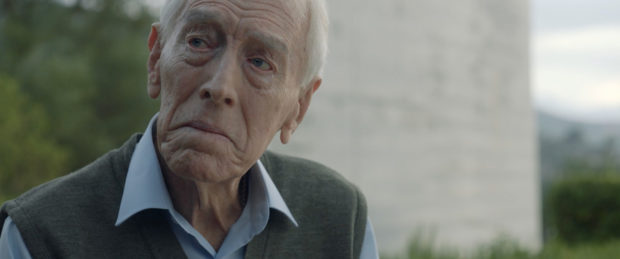“Echoes of The Past”: a Movie on the Kalavryta Massacre Perpetrated by the Nazis
On December 13, 1943 German soldiers executed close to peo1200 people in the Greek town of Kalavryta. It’s a grim 78-year anniversary of one of the darkest moments in modern Greek history. Now, a powerful new film brings those events to life. Echoes Of The Past, starring the late Max Von Sydow, is one of the most expensive Greek films ever made and opened at the top box office spot in Greece back in November. It’s now available on Amazon Prime, Vudu, and various VOD platforms in the US.
We discussed the project and the passionate odyssey to bring it to the screen with writer/producer Dimitrios Katsantonis and executive producer Tom Souleles.

What was the genesis of the project? How did it come to be?
Tom Souleles: My parents are both from a small village outside of Kalavryta. I grew up hearing the story of what the Nazis did to the innocent people of Kalavryta and the nearby communities in 1943. When my own kids were old enough, my wife and I visited Kalavryta, so that our kids could see the history themselves. This trip occurred eight years ago in the summer of 2013. When my wife and I returned home to Chicago, we decided we wanted this story told both for those still alive who remember the event, and for the next generations to understand the horrors of war and fascism. I was fortunate to meet Dimitrios Katsantonis, and in time, this beautiful piece of work was created. My own father is 90 years old. Not to add to the pressure, but I promised myself that I would make this film before he passed. My father watched the film for the first time last week on Amazon Prime. It was a painful and emotional experience for him, but he was happy the history is remembered.
Demetrios Katsantonis. From its very inception back in 2015, the project’s raison d’etre was to make the Kalavryta Massacre known outside Greece, immortalize in celluloid the horrible events of that fateful day, and keep the memory alive. What happened in Kalavryta is something that humanity should never forget or let go of. The past and its echoes, after all, are always with us since we are – both individually and collectively- products of history, and, unless we face that fact, we are bound to keep repeating the same mistakes and give birth to the same tragedies ad infinitum. A country’s, as well as a society’s present, is always defined by the interpretation of its past.

Max von Sydow at Kapi Hill where the mass execution took place
In dramatizing such a major historical event what were the challenges in writing the script? The narrative device of the German lawyer investigating reparation claims is particularly interesting.
Katsantonis: Almost any historical event is plagued by the aptly named “fog of war’ – not one account is the same as the next – and as a writer, you are called to navigate those oftentimes treacherous waters and produce a body of work that stays true to the core of the event. It’s a fragile balancing act that almost always leaves some people unhappy. Another challenge particularly with independent filmmaking is to write a script that can be shot within a realistic budget especially when part of the film is a period piece – ergo costly to recreate accurately. Having the dual role of writer/producer meant that from the project’s inception, I was writing the story with a provisional budget in mind, trying not to stray from the bounds financial reality dictated while at the same time staying true to the narrative needs of the screenplay.
When I started working on the script the issue of war reparations was very topical in Greece. So, instead of a straightforward historical film, I thought it would make far more sense to embrace a story that could also touch the present and highlight how important the past remains even in the context of a European Union almost a century later. To have a German lawyer travel to Kalavryta, the place of the tragedy, to investigate the facts at the core of the legal claim lodged by the victims and, while on the job, to embark on a personal journey of self-discovery gave the story a degree of poignancy universal in its reach.
Max Von Sydow gives a powerful, nuanced performance. How did you get such a legendary actor to join the project?
Katsantonis: I wrote the character of Nikolaos Andreou with Max von Sydow in mind. So, once the financing of the film was in place I contacted his London-based agent and sent her the script. It was about two weeks later when I got the call from her informing me that Max loved the script and he was eager to be involved in such an important story. I was on cloud nine for the rest of that day. Talking about Max, I will never forget the day he visited the museum in Kalavryta. He was so genuinely overwhelmed by the tragedy he could hardly contain his tears. He was very committed to the project from the very beginning and always thought that Echoes of the Past was a film he would be proud to have in his filmography. It’s so unfortunate, to say the least, that he never got to see the film. He passed away a month before the first cut was finished.
Director Nicholas Dimitropoulos’ vision is both sweeping and intimate. How did he come aboard the project?
Katsantonis: Echoes of the Past couldn’t have asked for a better director than Nicholas. We were introduced by a common acquaintance while I was still in Los Angeles pitching the project to various production companies. After he read the script and we spoke on the phone, I had no doubt that he was the right man for the job. His commitment, dedication, and empathy along with his unquestionable talent proved to be the ideal combination.
Was this an international co-production with Greece? I see there are several presenters including EPT, Cosmote TV, and the Greek Film Centre. How involved were Greek media companies in getting the film produced?
Katsantonis: Although the project started with Tom and I in the US, the production was all Greek. I brought the project to Greece in 2017 with about 40% of the budget in place and, after a brief negotiation period, Foss Productions, led by CEO Stelios Cotionis, became the main production company on record. EKOME (the Greek Production Fund) was the first to jump on board shortly after that followed by Cosmote TV, ERT, and the Greek Film Centre. The role of all these companies was purely financial. That being said, Echoes of the Past being an expensive production – at one point we had 600 extras working in the historical part – their involvement was no less important.
In bringing such a tragic chapter of history to life, were there any memorable moments during shooting that gave you pause to connect with the real events?
Katsantonis: When we were shooting the school scene, we constructed an exact replica of the school at the old Athens airport. I was standing inside the school next to the SFX people and their pyro equipment. The women and children were locked inside one of the classrooms, and I distinctly remember how it felt when the pyro equipment was turned on to replicate the conditions at the time. The intense heat and thick smoke made one feel he was standing in the middle of a nightmare come to life. Dante’s inferno came to mind as the screams and the cries of the trapped women and children tore through the structure. I can’t even imagine how it must have felt back on that fateful, tragic day, but I do remember myself looking at the main door and longing for the bone-chilling, sharp cold of winter on my face. I wished I could be anywhere but there. As the fire and the smoke became more and more intense in tandem with the lamentations of all those women, I found myself battling a suffocating feeling of utter consternation. Without wanting to sound too melodramatic, I always felt an immense burden of responsibility throughout my time working on the film, but that day it hit home like no other.

Commandant Tenner who organized the massacre
The film has engendered some controversy, notably from the current residents of Kalavryta who claim it takes some liberties with the facts surrounding the massacre. How have the producers responded to that?
Katsantonis: The main point of contention was the character of the Austrian soldier in the film. Despite a number of eye-witness accounts – the Jewish Holocaust Museum holds fourteen in its archives – some believe very strongly that the Austrian was the product of German propaganda and that the women and children escaped the burning building on their own (which they did since the Austrian is alleged to have opened only one of the five doors). I am not a historian so I won’t argue the facts. I always felt that the Austrian and his role in the tragedy – real or manufactured – provided a glimmer of hope that, even in the darkest hour, humanity survived the madness of war. The film – inspired by true events instead of based on true events, an important distinction – has a lot of fictional characters. Moreover, and since history often comes to us with one-dimensional characters, mythology building even around historical figures is paramount in creating a nuanced story able to move the audience and to stir their feelings and emotions. A film is not meant to author history or be interpreted as an academic treatise.
The film opened #1 at the Greek box office in November. That must have been truly validating. In general how have Greek audiences responded to the film?
Katsantonis: Yes, it certainly was: two straight weeks at number one, beating a blockbuster like the Eternals, doing a little over 40,000 tickets in our first week despite the pandemic. Both critics and audiences, by and large, responded positively to the film. In our international premiere at TIFF (Thessaloniki International Film Festival), we received the Youth Audience Award. Word of mouth remains strong and we expect great rental numbers from Premium VOD too.
Although the film is now available on Prime Video, are there any plans to screen it in North America and elsewhere? Both for Greek and non-Greek audiences?
Katsantonis: The film is available in the States on all the major cable platforms (VOD) as well as Amazon Prime and VUDU. Although our original plans did include a limited theatrical release, the pandemic made those plans obsolete. In terms of distribution, the film will soon be released (VOD) in Brazil, LATMA, and the UK. Our LA-based sales agent, House of Film, is currently in negotiations with a number of distributors in various territories so expect more release dates to be announced soon.
We have also submitted the film to various international festivals – so, fingers crossed, there will be full cinema screenings in those venues.
















0 comments